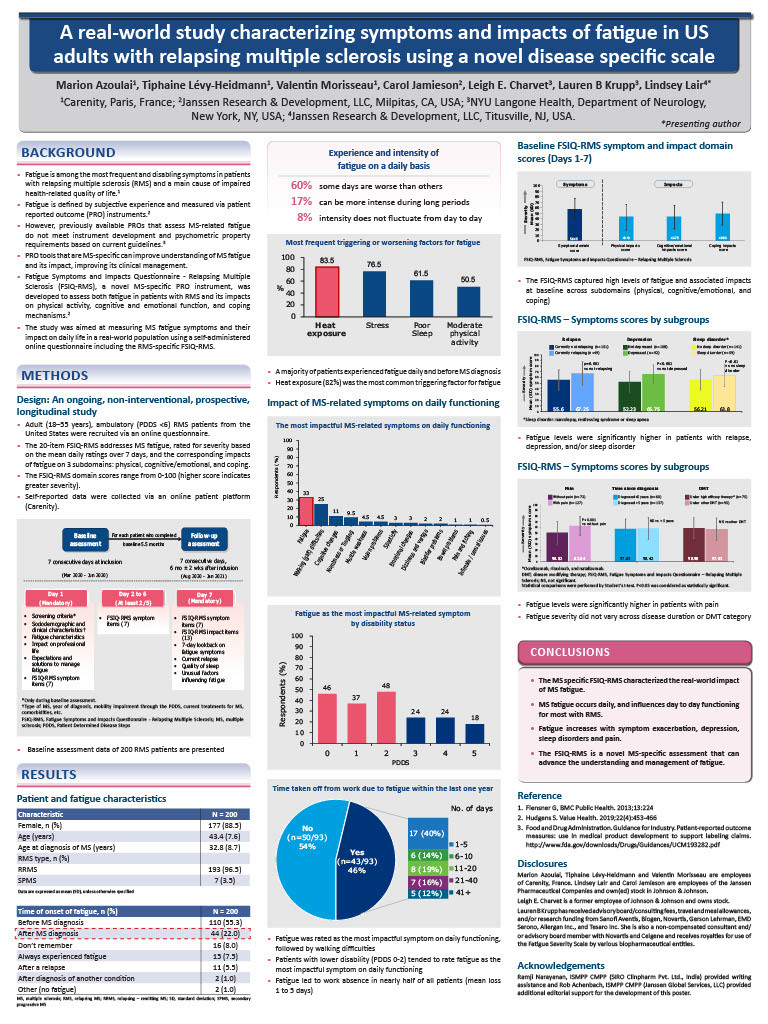A real-world study characterizing symptoms and impacts of fatigue in US adults with relapsing multiple sclerosis using a novel disease specific scale
Abstract
Background:
Fatigue is among the most frequent and disabling symptoms in relapsing multiple sclerosis (RMS) patients.
Objectives:
To measure MS fatigue and its impact on daily life in a real-world population using a survey including the RMS-specific Fatigue Symptoms and Impacts Questionnaire-Relapsing Multiple Sclerosis (FSIQ-RMS).
Methods:
This is an ongoing noninterventional prospective study of RMS patients recruited across the USA via an online survey. Participants completed questionnaires including disease history, status, sleep, social and emotional functioning, and the FSIQ-RMS, administered daily for 7 days. The FSIQ-RMS addresses the symptoms of fatigue, and scores range from 0-100 (higher score = greater severity).
Results:
A total of 142 RMS patients completed the 7-day assessment: mean age: 43.5 yrs; 87% women; mean diagnosis age: 33.2 yrs. Fatigue levels were severe and had high impact with a mean score during the 7-day period of 59.5 for the FSIQ-RMS symptom domain; 3 impact sub-domain scores were 45.1, 44.9 and 50.6 (physical, cognitive/emotional, and coping). The most impactful symptom on daily functioning was walking difficulties, followed by fatigue. A majority of patients (56%) experienced fatigue before MS diagnosis. Most patients (72%) were not currently relapsing and had a mean fatigue symptom domain score of 56.2 (vs 68 in relapsing patients).
Those with lower disability rated fatigue as the most impactful symptom on daily life. A majority of patients were not depressed (56%) nor reported a sleep disorder (72%), yet still reported mean fatigue symptom domain scores of 53.7, 58.1 respectively (vs 67, 63.3 with depression or sleep
disorder). Heat exposure (82%) was the most common triggering factor for fatigue.
Conclusions:
In this survey including the novel RMS specific FSIQ-RMS, fatigue occurred in most MS patients and influenced daily functioning. The FSIQ-RMS measures fatigue symptoms and impacts, which are relevant and meaningful to patients.
A real-world study characterizing symptoms and impacts of fatigue in US adults with relapsing multiple sclerosis using a novel disease specific scale
Marion Azoulai1, Tiphaine Lévy-Heidmann1, Valentin Morisseau1, Carol Jamieson2, Leigh E. Charvet3, Lauren B Krupp3, Lindsey Lair4*
1 Carenity, Paris, France; 2 Janssen Research & Development, LLC, Milpitas, CA, USA; 2 NYU Langone Health, Department of Neurology, New York, NY, USA; 3 Janssen Research & Development, LLC, Titusville, NJ, USA
*Presenting Author
Encore abstract: Poster previously presented at the 8th Joint ACTRMS-ECTRIMS Meeting, September 9-12, 2020

